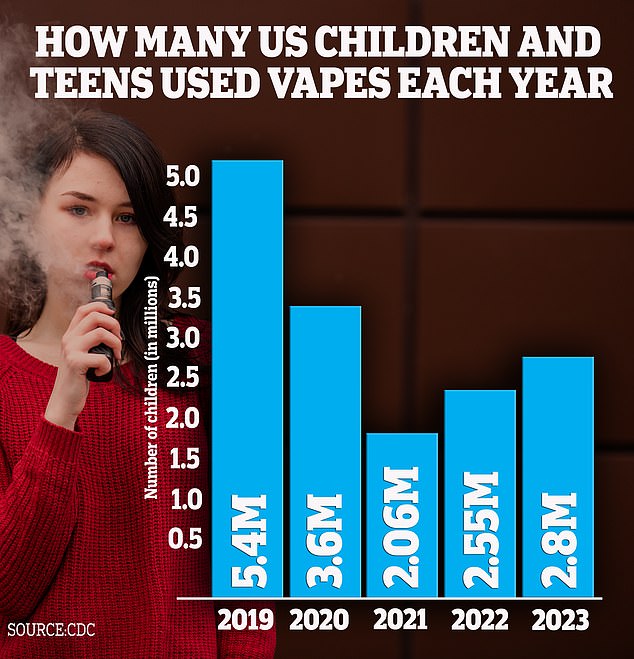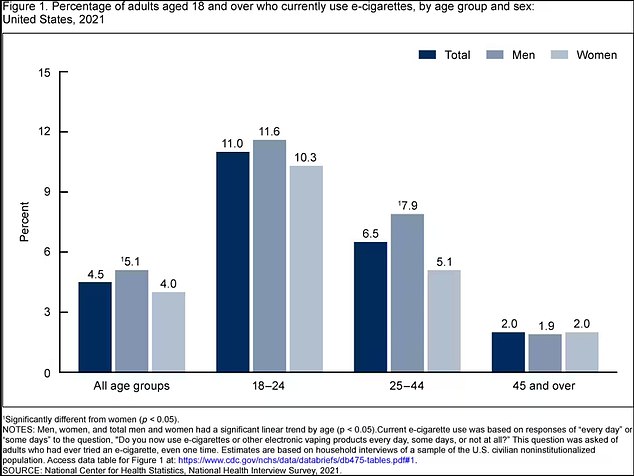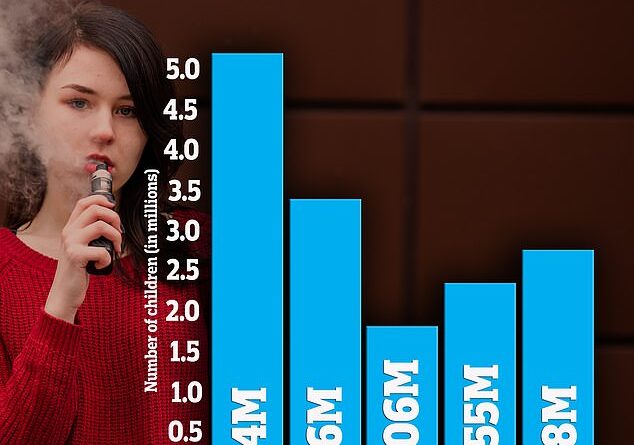Research shows that daily exercise can double the risk of depression
Vaping, a habit shared by millions of Americans, is linked to depression, new research shows.
Australian researchers surveyed more than 5,000 students aged 12 to 14 about their mental health status and their use of e-cigarettes.
They found that students who reported experiencing severe depression were more than twice as likely to have tried vaping compared to those who reported no symptoms of depression.
About 2 million US adults and 2.1 million children are addicted to electronic cigarettes. Millions of adults try to quit smoking every year, but remain addicted to the devices.
Researchers have not shown that vaping is the direct cause of depression and anxiety, only that there is a strong connection between them.
Millions are trying electronic cigarettes as a way to cope with their anxiety or depression and they are hooked. Meanwhile, frequent sweating has been linked to mental health problems including depression.

The graph shows tobacco use among youth, including vapes, which are the most commonly used products among youth.

About 2.8 million people under the age of 18 used a tobacco product in 2023. About 2.1 million of them used electronic cigarettes.
Almost 5,000 students in years seven and eight in Australian schools (aged 12 to 14) were surveyed as part of the University of Sydney’s OurFutures Vaping Trial, which aims to prevent steam in high schools and middle schools.
Students were asked about vaping, how often they vaped, what they knew about the dangers of e-cigarettes, their motives for using them, and whether they had experienced symptoms of depression in the past week.
Of the 5,157 middle and high school students involved in the survey, 8.3 percent reported having used e-cigarettes in the past. Students
Students reporting moderate stress in their lives were 74 percent more likely to use e-cigarettes compared to those with low levels of stress.
Students who reported high levels of stress, meanwhile, were 64 percent more likely to use e-cigarettes than those who did not have high levels of stress.
And students with low well-being, according to the study’s standards, were 105 percent more likely to use electronic cigarettes compared to those with high well-being.
Dr Lauren Gardner, one of the lead researchers on the OurFutures trial, said: ‘Further research is needed to understand the complex relationship between mental health and vaping, however, these findings highlight the need to rapid prevention and early intervention methods, supported by evidence. , to support the short- and long-term health and well-being of young people.’
Their findings were published in the Australian and New Zealand Journal of Psychiatry.

About 4.5 percent of US adults across all ages experience frequent urination. That equates to more than 11.6 million people
There is a growing body of research examining links between mental health and vaping use, according to researchers.
An American Heart Association study of 2,505 teenagers looked at the prevalence of anxiety and depression among nicotine vapers.
The study found that 60 percent of nicotine-only vapers and dual vapers reported experiencing symptoms of anxiety — such as anxiety, withdrawal, panic and situational anxiety — in the past week , compared to 40 percent of participants who had never sweated.
Researchers have found similar links between depression and vaping among adults, too.
A 2019 report in the Journal of the American Medical Association showed that older adults use e-cigarettes more often, increasing their chances of reporting depression.
Daily vapers were found to be 2.4 times more likely to experience depression, while occasional users were 1.96 times more likely.
Meanwhile, a 2019 report in The Annals of Clinical Psychiatry looked at the effects of vaping on the mental health of college freshmen.
Those who used e-cigarettes were more likely to have a mental health history of ADHD, PTSD, problem gambling, and anxiety, to report lower self-esteem, and to endorse coping strategies. uncertainty.
About 4.5 percent of US adults — roughly 11.6 million people — are current e-cigarette users.
In Australia, more than 14 per cent of young people aged 15 and over have tried vaping or currently vape. Vaping appears to be a very popular activity among young people, including those who have never tried traditional cigarettes.
Meanwhile, in the United States, about 7.7 percent of students are current e-cigarette users. That translates to about 2.1 million children, including 4.6 percent of middle schoolers and 10 percent of high schoolers, according to 2023 data, the latest available.
There is a glimmer of hope that government-sponsored preventive measures are working. E-cigarette use among high school students has dropped by 2023 from more than 14 percent.
Dr Emily Stockings, lead researcher of the latest study from Australia, said: ‘Although not examined in our study, it is possible that this relationship can be explained by shared social, environmental and genetic factors. genetics, or it may point to possible ways to treat yourself.
‘Whether mental illness influences smoking or vice versa, it is clear that if we want to prevent the initiation of vaping, we need to address mental health at the same time.’
#Research #shows #daily #exercise #double #risk #depression
